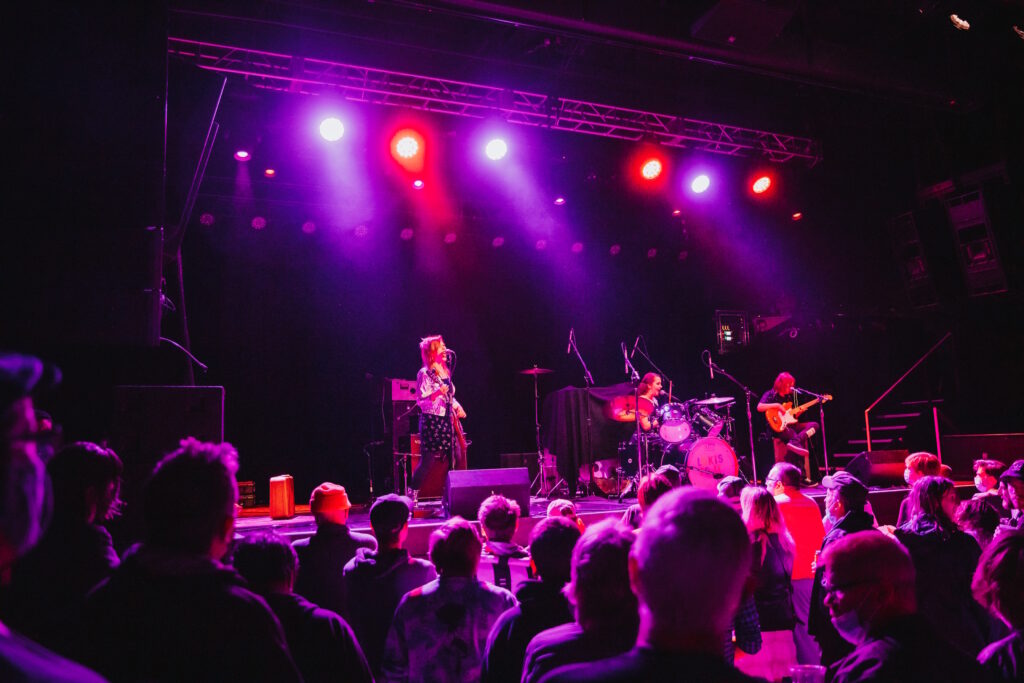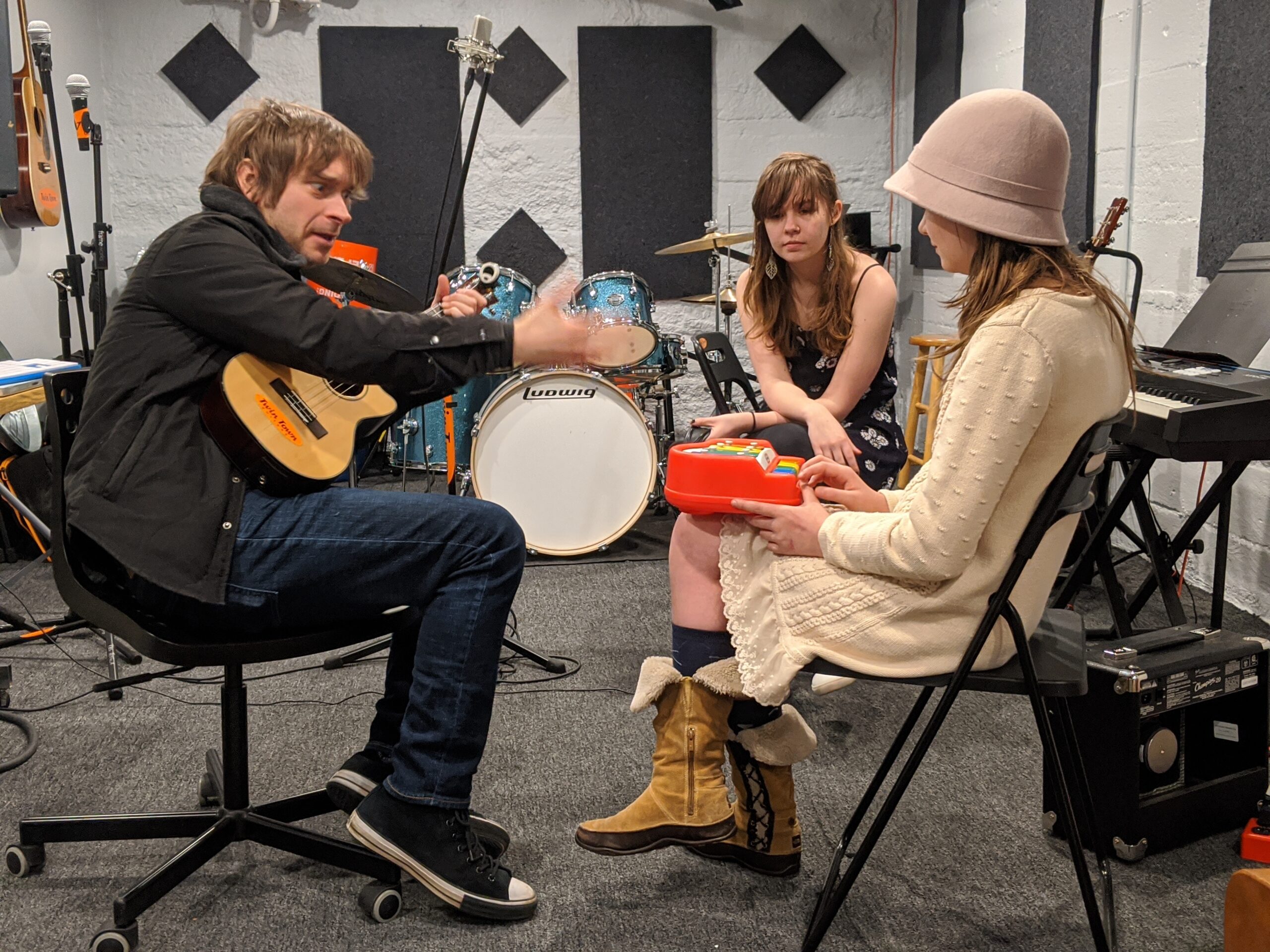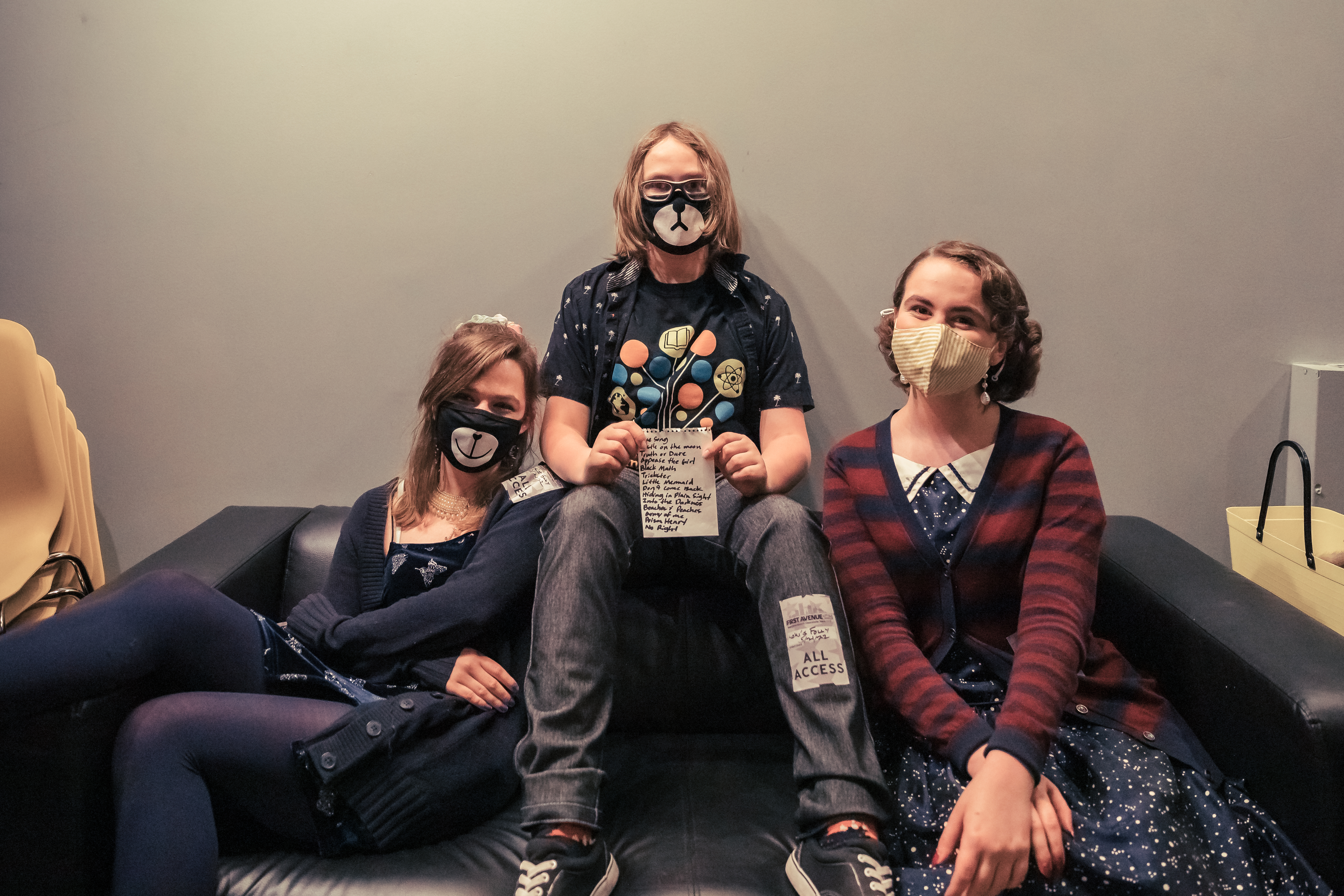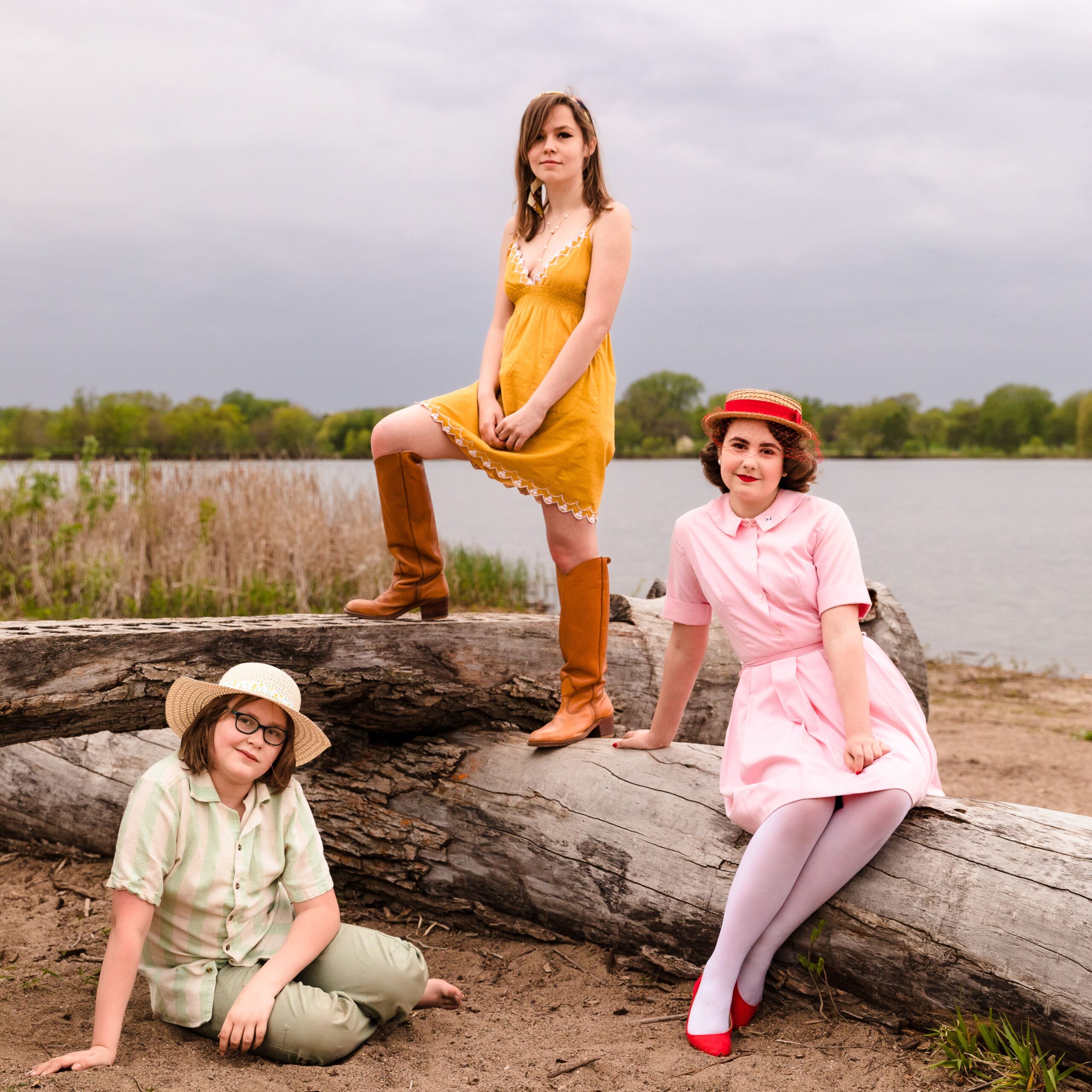The great state of Minnesota is home to a plethora of revered artists from varied genres and eras, from Judy Garland to The Andrew Sisters to Eddie Cochran to Prince to Lizzo.
And the beautiful state has been at the forefront of punk music, from The Trashmen to The Suicide Commandos to The Suburbs to The Replacements to Hüsker Dü to Soul Asylum to Babes in Toyland to Dillinger Four to Motion City Soundtrack to Off with Their Heads. Whatever subgenre punk would find itself spliced into over time, the North Star State was there, offering up their strong contributions.
The latest act in this proud lineage is Loki’s Folly, a band comprised of siblings Annie, Nissa and Oskar Kuchenmeister. With a median age of 16, you may suspect that the band have only just sprung up, but you may be surprised to hear that they’ve actually been working on their recently-released debut album, Sisu, for over half-a-decade.
On the day of the album’s launch, Annie spoke to Post-Burnout about the long process of creating Sisu, the difference in perspective offered from working with her two younger siblings, being a part of the proud Minnesotan punk ancestry, playing the iconic 7th St Entry, working with various legendary producers on the album and more.
__________________________________________________________________________________
So, I was wondering if you could just kind of give the basic origin story, I guess, of how you guys started and stuff?
Yeah, yeah. So, me and Nissa – my sister and the drummer – both started taking music lessons about eight years ago. We were learning…she was learning drums and I was learning guitar, obviously! [Laughs] And we stuck with those! We both had this, like, strong intention of wanting to be in a band, so as we were taking lessons, we were like, “Why don’t the two of us be the band and it’s just us?” [Laughs] So we started working on things together in our lessons and it just kind of kept spiralling from there. [Both laugh]
But there was a huge age difference between you guys, right? Like, so, when the band formed, how old were the members at that point?
Yeah, so we started learning when I was 14, which would make my sister 9. [Both laugh] And, then, my brother 4, which obviously it took him a little while to join the band. [Both laugh]
So, were you like a musical household or, like, was it something you just did in your spare time?
Yeah, it was something we were both drawn to. We kind of got into bands like Green Day and My Chemical Romance and then [Laughs] we talked to my mom about it, and she was like, “Oh, well, if you liked that you should try The Replacements. They’re from Minnesota. I think you would like them,” and then that just kind of got us into all this other cool stuff until it was, like, just an obsession of something we wanted to do. [Both laugh]
Perfect! So, you guys are from Minneapolis, as you mentioned. Is that, like, a city that’s very catering to young artists? For example, would the clubs in town be all ages or would it be 21+?
Um, it’s definitely a lot more 18 or 21+ shows. There aren’t as many all ages, but we’ve been playing 21+ shows since we were, you know, 16 and my sister being 12. [Laughs] So, it hasn’t been an issue for us, personally, but going to shows, you know…I mean, we can go with our parents. [Laughs]
Yeah, and when I was kind of listening to your music, I thought there was interesting influences from all over the place: I mean, I got a lot of K Records vibes, bands like Beat Happening and Shonen Knife, as well as Kill Rock Stars bands, you know, Bratmobile, Bikini Kill and so on, as well as modern influences, like The Linda Lindas and so on. Yeah, I was wondering what you were listening to specifically when recording this record?
Yeah. Well, I think for a lot of these songs, we were kind of pulling from, like, all of our favourite things and it kind of, you know, mishmashed in different songs and it would be like, “Oh, check this out: we should add something like this bridge in this song” and “Oh, we should add this together.” I think on, I wanna…I think it was “No Right,” we had, like, sat down and put like…what were the bands? Oh, it was Boomtown Rats…
Oh, sweet! [Laughs]
Yeah! [Laughs] Em…The Jesus and Mary Chain and Wizard Women of the North, and we were like, “Let’s pull this from that, and this from that, and this from that, and this from that!” and then “No Right” came out of it. [Laughs] So, not necessarily a specific, you know, “Let’s be sure to make these all sound like this,” but more just like, “Let’s find everything that’s our favourite and make it our thing.” [Laughs]

L-R: Annie, Nissa and Oskar.
Photo by Mika Larson. Courtesy of Reybee
You guys are, I think, probably of the first generation where you’ve had an unlimited library of, like, music kind of at your fingertips…
Yeah!
I’m 29 and even for me I remember I still had to buy CDs and stuff when I was a kid. [Both laugh]
Yeah!
But now it’s like, through things like Spotify and Apple Music and so on, it’s like you can just listen to a bit of everything. I was wondering, was that always your environment or do you guys have any particular feelings, like for example, on vinyl coming back now in popularity? I see you have vinyl behind you and stuff. [Laughs]
Yeah! [Pointing to three shelves full of vinyl behind her] No, I don’t really buy….! [Both laugh] Yeah, we’re definitely big fans of vinyl and all of the, you know, resurgence of things. I think also, I mean, me and my sister really, you know, from a young age, really enjoyed, like, thrift shopping and going to different second-hand stores and stuff and I think that’s probably where we first started getting into vinyl, where we’d see all the cool old records, and be like, “That’s such a cool thing! You know, give me more! And another one and another one!” [Laughs]
Kind of looking at your lineage, coming from Minnesota, I mean it’s such an iconic city even though it’s a relatively small city; I think it’s similar actually to Dublin, where I live, just size-wise. But it’s like, you’ve had Prince and, presently, Lizzo. But, like, when it comes to punk, you had, as you mentioned, The Replacements, you had bands like Hüsker Dü and Suicide Commandos and all these really cool bands over the years, and it seems like they’re very accommodating to the new generation. I mean, I know Soul Asylum, you’ve worked with on this new record, you’ve done shows with them and stuff. Do you feel a part of that lineage and, if so, is there any pressure? [Laughs]
Yeah! I mean, it’s definitely big shoes to fill. I think there’s so much amazing music that comes from the Twin Cities and it’s like, I don’t know, almost absurd how many really cool bands come from here and I guess, obviously, that was something that we were really, really inspired by in the beginning. You know, finding all these bands and being like, “Wow, they’re from here. We could be just like this.” And then, as we kept moving forward with the band, actually getting to meet some of those people and having them be so supportive was just mind-bogglingly, like, just so insane! [Both laugh] It made us so happy, and I think it’s really cool how supportive the older generation of bands are. I mean, we’ve just experienced nothing but kindness and support and wanting to help us get to the next level and making sure that we’re safe and comfortable at shows and that everything just feels really great. I guess I would be more nervous if they weren’t so kind. [Laughs]
Yeah, and that’s the great thing, I think, is that’s always kind of been the case. Like, Soul Asylum are helping you guys but, for example, Bob Mould was helping them when they were like new.
Yeah!
I just, I like the idea of that kind of passing it down, rather than gatekeeping, you know what I mean?
Yeah, yeah!
And being exclusionary, I mean.
It’s a nice cycle of, you know, passing things through the generations!
Absolutely, and hopefully you guys continue that legacy. [Both laugh]
Yeah, yeah!

Photo by Loki’s Folly. Courtesy of Reybee
So, your new album is called – I’m probably going to mispronounce this – “Seez-su”?
Sisu.
Sisu. Which is a Finnish word which means, I think, “inner strength” or “the conviction to go on?”
Yeah!
I was wondering how you came about that word?
Yeah. Well, so we’re Finnish by heritage, so it’s kind of a word we, you know, grew up hearing a lot and, you know, you see the little stickers people make and [Both laugh] it’s, like…it’s a very natural concept to our family and how we understood it. But it was kind of something that, through the pandemic and through how long it also took us to take this record, I think…I think Nissa was the first one to say it and that it was just, like, well, I mean that’s it. That’s exactly how like, I don’t know, the world feels right now and that’s how the album feels right now; that we’ve just gotten through all these different things and it’s, like, it’s taken a lot of getting through [Laughs] to get to this point.
Well, the album started, I mean, in 2017, which I think for anyone is a huge…between then and now – it’s just coming out today, as we speak – I mean, that time for anyone…but specifically for people as young as yourselves, that’s probably like an eternity. I mean, that’s probably like a third of your life. [Laughs]
Yeah, it’s pretty much that! It’s our entire childhood, young adulthood all wrapped up in a little package, you know! [Both laugh]
When you’re in the midst of making that, does it seem ceaseless? Does it seem like this is something that can never be made, I guess?
Yeah, I mean, I think it was mostly – since it was our first album and we were just getting started off – it was kind of a process of just taking whatever opportunities we could find at any time. So, it was a slow build but I think it was worth it to, you know, get to work with a lot of people and get to have the best experiences and not have to…I mean, I think overall it worked out for the better to get to kind of really work on making this the best first thing [Laughs] that we could put out.
And when I’m looking at the production credits on this album, you have the late, great Ed Ackerson – may he rest in peace – from Flowers Studio, who has worked with, like I said, Lizzo and Motion City Soundtrack; you have Kevin Bowe, who was from The Replacements; and then you also have John Fields, who’s worked with everyone, like Miley Cyrus, The Jonas Brothers. [Laughs] I mean, he’s really, you know…worked with these massive stars. I was wondering what you think each producer kind of brought to the album? Because, when I listened to – like, I listened to it before having read the press kit – and, to me, it seemed consistent throughout. I would’ve had no idea there was this many producers and that it was this many years in the making at all.
Yeah. Yeah. I mean, I think…it’s interesting because I think actually all of our different experiences were very different from each other but all, like, very good experiences. So, working with Ed Ackerson was just amazing and it’s so sad that we’ll never be able to get to do that again. He was an amazing guy and I think, even though in the literal space, working with him, it was very quiet and focused and we worked through things. And then, working at IPR with Kevin Bowe, it was, you know, a lot more energy and there were more people and a lot more going on all at once. But, overall, I think we talked about our philosophy with how we wanted to record and what we wanted the end sound to kind of sound like, with the kind of live, Hüsker Dü-ish, very punk and raw sound, and I think having that communication and also having them all be supportive and really listening to what we wanted and being able to help us get what we wanted. So, you know, if it’s like, “Oh, I kind of want it to be like this,” then they could be like, “Yes! Here’s how you do that!” [Both laugh] It made it, you know, just work really well. So, it was nice having, you know, such amazing people and then just so supportive as well.
Yeah, but specifically I guess what I’m asking about is, from your perspective, are you even just amazed at how consistent it is? I mean, I don’t mean to harp on it, but it is just kind of, when you think of how kind of fragmented the whole thing was, it’s insane that it’s turned out as precise as this.
Yeah! It’s definitely like…it feels a bit like a feat and I don’t really know how it worked so well! [Both laugh] I think, I mean, a lot of times if we’re showing it to people and we’re like, “Oh, yeah, we had this person, this person and this person and they’re credited here, here, here and here,” it makes it be like, “Oh, OK. Great. Let’s hear it,” and then it’s like, “Oh! This is a cohesive, you know…one after the other, they go together well” sort of thing. So, you know, some sort of universal magic made it all work well.
And, after acknowledging the huge feat you went through, are you going to be mad at me if I ask, “So, what’s for record number two?” [Laughs]
[Communication error] Um…how much, um…?
No, I was just wondering do you have plans for record number two or are you just like, “Let’s just get this over with!” [Laughs]
Oh, yes! Yes, I mean, we’re excited to be putting this out and we’re putting, you know, our full force into it, but we have started working on demoing and writing for the next album, so it shouldn’t be quite the same stretch of time as this one! [Laughs]
I don’t mean to harp on the age thing but one thing that I noted from this album is that there is kind of a motif of children’s party games that are kind of…that have a sinister edge to it and things like that. And I was wondering, like, do you think those themes can be made when the median age [of the band] is so young versus when, you know I’m assuming this is something you’re going to persist with, like, in your 20s, maybe even in your 30s…
Yeah!
Potentially, right? [Both laugh] Do you think those sorts of elements will be phased out or do you think…I don’t know, do think they could always be potentially part of your writing?
Yeah. I mean, I definitely think a lot of, you know, youth and childhood things are very appealing to me, as you can maybe tell from this room you see me in right now! [Both laugh as Annie shows the room, which has childlike illustrations of a house in the woods painted on the walls] Um, so I think those things are kind of always probably going to have some influence, I mean especially fairy tales and things like that. I mean, you know, with the “Little Mermaid” and stuff like that, those things just have a really strong connotation in my mind that I just really…there’s something that I just really like about them, so those types of things probably will stick through, you know, at least [that’s] my prediction right now, you know? In ten years’ time, we can look back and be like, “Oh, no! She stopped right after!” [Both laugh]
Well, what I really enjoyed from the lyrical aspect was that it seemed to go, on a dime, from really abstract to being very direct. I was wondering, from the lyrical perspective, the one I highlighted was “Beaches and Peaches,” which I think is very darkly comic. I don’t know, it seems like it could almost be a song about political apathy, but I read it more so as a hopelessness that a lot of people feel nowadays, where it’s like you look at things like climate change or something like that or war, and it’s like, “Eh! We do what we can! But, you know, what can we really do?” [Laughs]
Yeah! [Laughs]
And I think a song like that is very therapeutic in a way, where it’s kind of like, you know, “We don’t really have the answers but we feel it!” [Laughs]
Yeah! I think you summed it up pretty perfectly! [Both laugh] It was definitely that feeling of, like, “Well, this sucks, and there’s, like, nothing we can do about it!” [Both laugh] So, yeah, it came definitely out of those emotions, and I think, like, the chorus really gets to that, just like, what can you even do at this point? But I think trying to give it that fun, happy vibe to kind of push through those very depressive feelings. [Laughs]
That’s something that I really enjoy, is that it seems like the band is very respective…because, you know, there is a huge age difference between each individual member of roughly about three or five years…?
Yeah, I think it’s five between each.
Yeah, but everyone’s perspective seems valid which I think is very important. Do you feel that – being the eldest – do you feel that you’re learning stuff from their perspectives, too? Because, like, for a song like “Beaches and Peaches,” we might feel a sense of hopelessness but one advantage we might have is that we have the ability to vote, for example, where people under 18 don’t even have that, you know what I mean? [Laughs]
Yeah!

Courtesy of Reybee
So, do you think their perspectives, I don’t know, in an artistic way, evolved your artistic outlook as well?
Oh, yeah! Definitely. I mean, we try to collaborate as much as we can on songs and I think it is really fun to have, like, everybody’s different perspectives, especially from the age standpoint. Where, Oskar, for example, is 12 and just starting out and I think it’s really cool sometimes when he’ll pull something out of nowhere that I would just never think of because it’s like, “Oh, well, the rule is, you know, when you write you do this and, when you write a chord progression, it should go in this order” and it’s nice to have that sort of inability to…well, not inability, but you know, a fresh…
A kind of disregard, yeah? [Laughs]
Yeah, a disregard for what we already do, which I guess sounds negative but it’s very positive; I like having that new perspective of, like, “Hmmmm, let’s change this up!” and it’s like, “Yeah! Why didn’t we change this up?!” [Both laugh]
You guys are playing the 7th St Entry, which is, like, you know, such an iconic venue. When you guys play there, do you feel the history in the walls or something?
It totally feels like it and I think even just going to shows there, it’s like, “Wow. This is…” I mean, part of it too is seeing pictures and watching videos. I think there’s, on YouTube, there’s this one full set of The Replacements and they’re very early on, probably like 1982 or something, I want to say. 1983. And, you know, I’ve watched that a million times! [Both laugh] And, like, seeing that and then seeing it in person, it’s just, like, very special and, since it hasn’t really changed much since then, it’s really cool and kind of magic.
Perfect. Well, I think I’ve asked everything I have. Is there anything you’d like to add before we wrap up?
I think you’ve got it covered! [Both laugh]
Thank you very much. Very nice talking with you.
Yeah, thank you. Thank you so much and thank you for doing the interview.
Yeah, of course! And enjoy your launch day!
Loki’s Folly’s debut album Sisu is out now and available to stream and purchase here. You can follow the band on their website, Facebook, Twitter, Instagram and YouTube.

Aaron Kavanagh is the Founder and Editor-in-Chief of Post-Burnout. His writing can also be found in the Irish Daily Star, Buzz.ie, Totally Dublin, The GOO, Headstuff, New Noise Magazine, XS Noize, DSCVRD and more.

 POST-BURNOUT
POST-BURNOUT